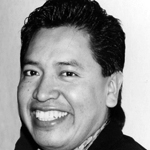|
|

Indigenous Nation: Maya Kiche
Nation State(s):
Guatemala /
Canada
Language(s):
Maya Kiche /
English /
Spanish
UN Region:
Latin America and the Caribbean
LEONZO BARRENO was
born and raised in Quetzaltenango, Guatemala. He obtained his primary and
high school education in Guatemala. He came to Saskatchewan in 1989.
After completing the language requirements (ESL) he immediately enrolled
in the Saskatchewan Indian Federated College (SIFC), where he obtained his
Bachelor of Arts, Honors, in Indian Studies in 1996. During his time as a
student he found employment at SIFC in the maintenance area, he then
served as an Administrative Assistant to the Director of International
Programs in 1992. In 1994, Mr. Barreno was appointed Coordinator of the
International Indigenous Programs, a position he held until the end of the
program in 1997. During his term as a Coordinator, more than 70 Indigenous
young leaders from 20 countries became SIFC students. The international
program offered a certificate in International Indigenous Management to
those who completed the program. The program was also offered for two
years in Costa Rica and one year in Chiapas, Mexico.
Between 1998 and 1999 Mr. Barreno, in consultation with the SIFC Elders
and executive, Government representatives and Aboriginal youth developed
the concept, goal and activities of the Aboriginal Youth Leadership
Development Program (AYLDP). Since 1999 AYLDP has created several
Leadership, Traditional and Academic programs for Aboriginal youth and
adults. In June 2000, Leonzo was appointed Director of the Indigenous
Center for International Development (ICID) of the SIFC.
As the administrative head of both the AYLDP and ICID, Mr. Barreno is
responsible for creating and implementing Leadership and Traditional
programs for local Aboriginal people and to oversee SIFCs International
commitments. One of the main duties under the International center is to
be the program manager of the Indigenous Studies and Education program in
partnership with the University of Chiapas, Mexico. The program is in its
fourth year and has resulted in the creation of a Masters in Indigenous
Education in Chiapas where 38 students have completed the Program, with
more graduates in 2003 and 2004. A Degree in Management and Indigenous
Self Development is under the approval process in Mexico and a
specialization in International Indigenous Issues is under development at
SIFC.
Leonzo has taught the Course "International Indigenous Issues at SIFC for
five years. He also taught the course Indigenous Philosophy and Religion
in the winter of 2002.
Leonzo has given presentations about Indigenous development and Indigenous
higher education in several Universities and forums in Chile, Guatemala,
Costa Rica, Nicaragua, Ecuador, Mexico and to the Inter American
Development Bank in Washington. He is the author of a study about Higher
Education Institutions and Programs for Indigenous people in Latin
America. The survey was used as a working document by UNESCOs gathering of
international experts in the topic in Guatemala in April 2002. Recently,
January 7, 2003 Mr. Barreno was approached by the Senate of Canada
Standing Committee on Aboriginal People, to participate in a study to
examine the issues affecting Aboriginal youth as the Committee aims to
develop an "Action Plan for Change that will benefit Aboriginal youth.
He is also participating in a study to analyze the technical need of
Indigenous teachers working in Indigenous communities in Latin America.
The study is led by the College of the Americas.
Leonzo has served in several local, national and international boards.
Source:
University of Saskatchewan, Centre for Continuing & Distance Education
and Extension Division - accessed April 9, 2007
Global Television Network Visiting Chair in Journalism; University of
Regina 2002 - 2003
The Global Network Visiting Chair spends one semester on campus teaching
Aboriginal Affairs, International Indigenous Issues, cultural diversity,
minority rights or Canadian demographics. In addition, the visiting
professor acts as a resource person for students, faculty and staff in the
School of Journalism, the Indian Federated College and across the
University of Regina campus.


Dialogue between:
Jose Molintos Menico, Ibaloi, Philippines
and
Leonzo Barreno, Maya Kiche, Guatemala and Canadaialogue with Jose Molintos Menico and Leonzo Barreno
Additional Resources:
Documents and reports - Visit to Guatemala by Professor Rodolfo
Stavenhagen, UN Special Rapporteur for the Human Rights of Indigenous
Peoples
Mission to Guatemala
E/CN.4/2003/90/Add.2
24 February 2003
"Executive summary: This report is submitted in accordance with Commission
on Human Rights resolution 2001/57, and covers the official visit to
Guatemala made by the Special Rapporteur on the situation of human rights
and fundamental freedoms of indigenous people from 1 to 11 September
2002."
Guatemala: Memory of Silence (English), February, 1999
Guatemala: Peace Agreements; United States Institute of Peace;
Peace Agreements Digital Collection
PBS Online NewsHour; Guatemala's Future, December 30, 1996 - Transcript
Yesterday, government and rebel officials signed a peace agreement ending
36 years of civil war. Charles Krause looks at the war, its impact, and
the future road to peace. A RealAudio version of this NewsHour segment is
available.
|